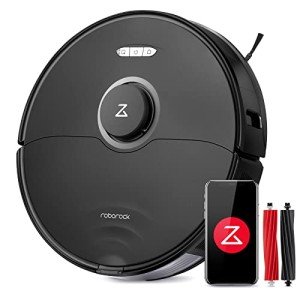7 Simple Tips For Rocking Your Robotic Vacuum
The Rise of the Robotic Vacuum Cleaner: Revolutionizing Home Cleaning
In the realm of home home appliances, robotic vacuum cleaners have actually emerged as one of the most considerable developments in recent years. These autonomous devices provide convenience and effectiveness, enabling property owners to keep cleaner home without the drudgery of manual vacuuming. This short article explores the development, performance, advantages, and considerations relating to robotic vacuum, in addition to supplying insights through data tables and regularly asked concerns.
A Brief History of Robotic Vacuum Cleaners
The journey of robotic vacuum started in the late 20th century, with early models failing to make significant strides in homes. Nevertheless, improvements in technology caused the introduction of more refined models in the early 2000s. Companies such as iRobot and Neato played a pivotal function in promoting these wise home devices.
Advancement Timeline of Robotic Vacuum Cleaners
Year
Milestone
1996
Introduce of the very first robotic vacuum, the ELECTROLUX TRINITY
2002
iRobot introduces the Roomba, a widely recognized model
2012
Introduction of designs with advanced mapping capabilities
2020
Incorporation of expert system for improved navigation
2023
Models with integrated smart home connection and app control
How Robotic Vacuum Cleaners Work
Robotic vacuum use a combination of sensors, mapping innovation, and artificial intelligence to browse and tidy various surface areas efficiently. Here's a streamlined introduction of their core functionality:
Sensors: Equipped with infrared or ultrasonic sensing units, these gadgets can spot obstacles, cliffs, and dirt, allowing them to browse through rooms without crashing into furniture or tumbling down stairs.
Navigation: Most modern robotic vacuum cleaners include smart mapping technologies, permitting them to draw up the home design and optimize cleaning courses.
Cleaning Mechanism: Using brushes and suction power, robotic vacuums gather dirt, dust, and particles from numerous floor types, including carpets and wood.
Charging and Cleaning Schedules: After finishing a cleaning session or when their battery runs low, these robotics instantly return to their charging dock. Users can set cleaning schedules by means of smart device apps, helping preserve a tidy home effortlessly.
Benefits of Robotic Vacuum Cleaners
Robotic vacuum use numerous advantages over traditional vacuuming approaches. Here are a few of the crucial advantages:
- Time-Saving: Automated cleaning implies property owners can assign their time to other activities.
- Convenience: Scheduling cleaning sessions permits for a clean home without manual intervention.
- Thorough Cleaning: Many robotic models come with specialized brushes to take on pet hair and supply deep cleaning on carpets and rugs.
- Smart Home Integration: Many units are compatible with clever home systems, using voice control and remote management.
Popular Features in Robotic Vacuum Cleaners
Function
Description
Mapping Technology
Creates a digital map of the cleaning location
Mobile App Control
Offers users the ability to start/stop or schedule cleaning sessions from another location
Self-Cleaning
Some designs have docking stations that can self-empty dust bins
Advanced Sensors
Spots dirt more successfully and navigates better
Voice Control
Suitable with virtual assistants like Alexa and Google Assistant
Considerations Before Purchasing a Robotic Vacuum Cleaner
While robotic vacuum cleaners offer many benefits, potential purchasers ought to think about a couple of aspects before making a purchase. Here are some indicate bear in mind:
Key Factors to Evaluate
Floor Type: Certain designs perform much better on carpets while others excel on difficult floors. robot hoover and mop UK ought to select versatile vacuums if they have actually mixed floor covering.
Battery Life: Longer battery life permits extended cleaning sessions. Try to find models that can cover large areas without regular recharging.
Dustbin Capacity: A bigger dustbin reduces the frequency of emptying, making cleaning less labor-intensive.
Noise Level: Some designs run silently, which is best for homes with children or sensitive family pets.
Maintenance: Users must also evaluate the ease of maintenance, especially for filters and brushes.
Prospective Drawbacks
- Price: Robotic vacuum cleaners can be significantly more expensive than traditional vacuums.
- Efficiency: While they effectively preserve tidiness, they may not constantly match the deep cleaning efficacy of manual vacuums.
- Obstacle Navigation: Some models may struggle with particular kinds of furnishings or messy areas, possibly resulting in missed out on areas.
Frequently Asked Questions About Robotic Vacuum Cleaners
Q1: How often should I run my robotic vacuum cleaner?
A1: It normally depends on your home. For good robot vacuum cleaner with pets or high foot traffic, running it day-to-day is advantageous. In less active homes, you may discover every other day is adequate.
Q2: Can robotic vacuum cleaners work on carpets?
A2: Most robotic vacuums can clean up carpets; however, functions such as suction power and brush design can substantially affect their efficiency on various carpet types.
Q3: Are robotic vacuum cleaners great for pet hair?
A3: Yes, lots of designs are specifically created to choose up pet hair and feature specialized brushes to prevent tangling.
Q4: What happens when the vacuum runs out of battery?
A4: Most robotic vacuums automatically return to their charging dock when their battery is low, guaranteeing they are all set for the next cleaning session.
Q5: Can I manage my robotic vacuum with my mobile phone?
A5: Yes, numerous robotic vacuum come geared up with mobile apps that allow you to set up cleanings, screen progress, and get notifications.
Robotic vacuum represent a substantial improvement in home-cleaning innovation, merging convenience with effectiveness to essentially modify how homes preserve cleanliness. As innovations continue to emerge, these devices are becoming progressively capable, offering users not only time-saving options however also improved cleaning experiences. As the marketplace continues to grow, prospective buyers are motivated to weigh the features, benefits, and factors to consider thoroughly to find the very best model tailored to their unique requirements. Whether it's a busy household, a family pet fan, or someone looking for automation in their cleaning regimen, there's likely a robotic vacuum that fits the bill.
